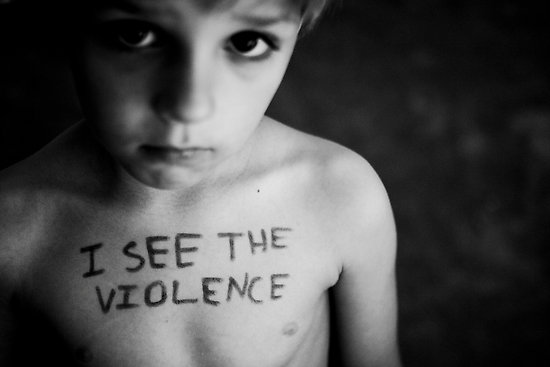What do children need? We know the answer from our own childhoods.First and foremost, children need a safe and secure home, free of violence,and parents that love and protect them. They need to have a sense of routine and stability, so that when things go wrong in the outside world,home is a place of comfort, help and support.
But for many children, home is far from a safe haven. Every year, hundreds of millions of children are exposed to domestic violence at home, and this has a powerful and profound impact on their lives and hopes for the future.
These children not only watch one parent violently assaulting another, they often hear the distressing sounds of violence, or may be aware of it from many telltale signs.
“Me and my sister are scared,” says one nine-year-old girl who lives in a violent home. “Our parents fight a lot and we fear
they might split up. They fight when we’re upstairs. They don’t think we know what’s going on, but we do.”
Some of the biggest victims of domestic violence are the smallest
The devastating effects of domestic violence on women are well documented. Far less is known about the impact on children who witness a parent or caregiver being subjected to violence. These children – the forgotten victims of violence in the home.
The findings show that children who are exposed to violence in the home may suffer a range of severe and lasting effects. Children who grow up in a violent home are more likely to be victims of child abuse. Those who are not direct victims have some of the same behavioural and psychological problems as children who are themselves physically abused.
Children who are exposed to violence in the home may have difficulty learning and limited social skills, exhibit violent, risky or delinquent behaviour, or suffer from depression or severe anxiety. Children in the earliest years of life are particularly vulnerable: studies show that domestic violence is more prevalent in homes with younger children than those with older children.
Several studies also reveal that children who witness domestic violence are more likely to be affected by violence as adults.
Children who live with and are aware of violence in the home face many challenges and risks that can last throughout their lives. There is increased risk of children becoming victims of abuse themselves.
There is a common link between domestic violence and child abuse. Among victims of child abuse, 40 per cent report domestic violence in the home.
There is significant risk of ever-increasing harm to the child’s physical, emotional and social development.
Infants and small children who are exposed to violence in the home experience so much added emotional stress that it can harm the development of their brains and impair cognitive and sensory growth.
Behaviour changes can include excessive irritability, sleep problems, emotional distress, fear of being alone, immature behaviour, and problems with toilet training and language development. At an early age, a child’s brain is becoming ‘hard-wired’ for later physical and emotional functioning.
As they grow, children who are exposed to violence may continue to show signs of problems. Primary-school-age children may have more trouble with school work, and show poor concentration and focus. They tend not to do as well in school. In one study, forty per cent had lower reading abilities than children from non-violent homes.
Personality and behavioural problems among children exposed to violence in the home can take the forms of psychosomatic illnesses, depression, suicidal tendencies, and bed-wetting.
Later in life, these children are at greater risk for substance abuse, juvenile pregnancy and criminal behaviour
than those raised in homes without violence.
Some studies suggest social development is also damaged. Some children lose the ability to feel empathy for others. Others feel socially isolated, unable to make friends as easily due to social discomfort or confusion over what is acceptable.
Many studies have noted that children from violent homes exhibit signs of more aggressive behaviour, such as bullying, and are up to three times more likely to be involved in fighting.
Children who grow up with violence in the home learn early and powerful lessons about the use of violence in interpersonal relationships to dominate others, and might even be encouraged in doing so.
Not all children fall into the trap of becoming victims or abusers. Many adults who grew up with violence in the home are actively opposed to violence of all kinds. There is reason to believe that children know that domestic violence is wrong and actively want it to stop. Many children who are present during acts of domestic violence try to help.


